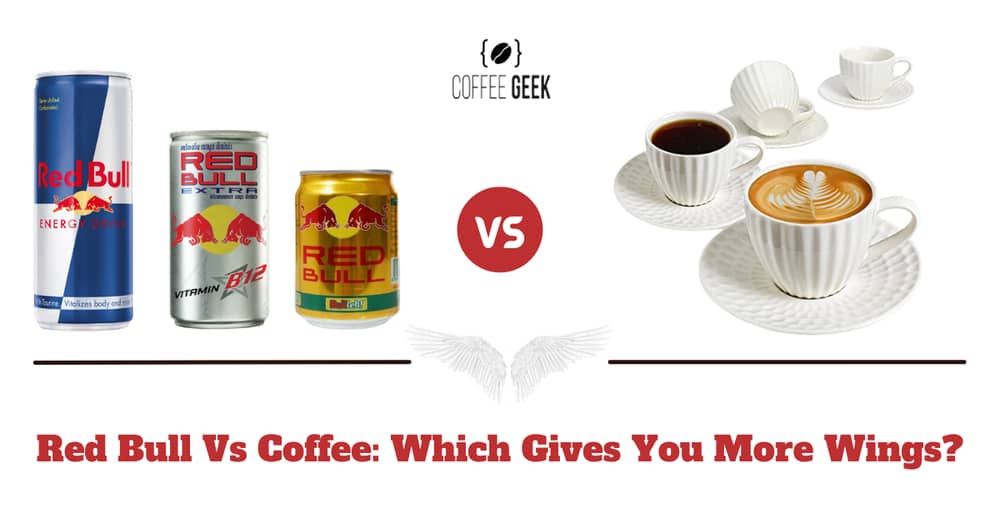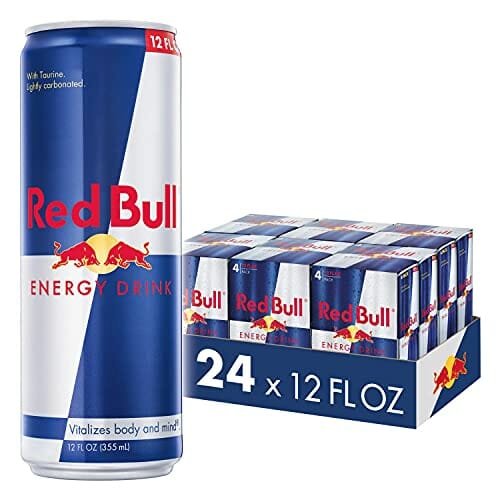Although coffee has been the most significant source of caffeine for many years now, energy drinks like Red Bull are quickly gaining momentum.
The brand’s famous phrase “Red Bull Gives You Wings” has earned them a massive client base, while some still pamper themselves with a classic cup of coffee.
Now the question is which drink is better? Which drink truly gives you wings? In this article, we cover the debate of red bull vs coffee to answer all questions.
Red Bull vs Coffee
Most people require a caffeine boost to help them get through the day; coffee has been that preferred drink for many, but ever since the introduction of energy drinks, many have switched to them, with the red bull being the most famous energy drink out there.
So are energy drinks a better source of caffeine or coffee? To figure out the difference between both caffeinated drinks and which is the best source of caffeine, we have discussed both beverages in detail individually before making a comparison. Lets review!
Coffee Overview
Coffee is freshly brewed by passing hot water through ground coffee beans.
These coffee beans that are actually seeded within the coffee plant’s berries naturally contain caffeine.
Caffeine is a natural stimulant that gives an energy boost to your physical performance and improves cognitive functions.
It acts on the nervous system to Coffee is also rich in antioxidants that help your body fight against harmful free radicals.
Pros of Coffee
- Coffee is all-natural
- It improves physical performance and brain function
- Lowers the risk of diseases such as; Parkinson, Type 2 diabetes, and Alzheimer
Cons of Coffee
- Overconsumption leads to insomnia and anxiety
- Coffee is a diuretic, and it could cause dehydration
- It takes time to be brewed
Nutrients in Coffee
Coffee is a rich source of nutrients, such as antioxidants and B Vitamins
A regular cup of coffee contains a decent amount of minerals and vitamins, such as potassium, niacin (vitamin B3), magnesium, and pantothenic acid (vitamin B5).
These minerals and vitamins offer many health benefits, including a reduced risk of certain illnesses. Many studies have shown that coffee consumption can lower the risk of diabetes, Alzheimer’s, and Parkinson’s disease.
But this depends on the type of coffee you typically drink and whether you include any sweetener or other ingredient in your coffee. However, the nutritional benefits of coffee are quite good when compared to energy drinks typically derived from synthetic sources.
Calories in Coffee
Presence of any additional ingredient or the type of coffee used to make a cup of coffee plays a significant role in measuring the calorie content.
Regular black coffee contains about two calories, which is pretty light. However, adding milk, cream, or chocolate to your coffee, increases the calorie count. For instance, a Latte (espresso made with steamed milk) contains around 190 calories.
Thus the amount of calories in coffee isn’t a set amount, and it can vary based on the kind of coffee you’re drinking at the moment.
Caffeine Content
One cup of coffee has about 94-95 mg of caffeine.
However, the amount of caffeine that is present in coffee is determined by many variables, such as the type of bean used, the roasting technique, and the serving size.
Sugar Content
Coffee itself does not contain any sugar content unless you add sweeteners like cream, milk, sugar, or chocolate.
Red Bull Overview
Red Bull is a carbonated drink that has caffeine and other compounds that boost energy levels, such as various B vitamins and taurine.
The exact composition of the red bull may vary depending on the country, but other major ingredients included in Red Bull are sugar, baking soda, carbonated water, citric acid, calcium carbonate, glucuronolactone, and artificial flavors and colors.
It’s also rich in a variety of B vitamins, such as Riboflavin (B2), Thiamine (B1), B6, Niacin (B3), and B12.
Pros of Red Bull
- It gives a strong, fast energy boost
- Helps you stay alert
- Red bull contains added vitamins
- It’s a ready-made drink
Cons of Red Bull
- Red bull is synthetically made
- It increases blood pressure
- Risk of heart disease
Nutrients in Red Bull
Red bull has many flavors, including the original and a sugar-free version; it also comes in different sizes.
The standard can size, 8.4-ounce (248-mL) of regular red bull contains:
- Protein: 1 gram
- Sugar: 27 grams
- Calories: 112
- Magnesium: 12% of the Daily Value (DV)
- Riboflavin: 21% of the DV
- Thiamine: 9% of the DV
- Vitamin B12: 213% of the DV
- Vitamin B6: 331% of the DV
- Niacin: 160% of the DV
Whereas the nutritional information of Sugar-free Red Bull varies, 8.4-ounce (248-mL) can of this red bull flavor contains:
- Protein: 1 gram
- Calories: 13
- Carbs: 2 grams
- Magnesium: 2% of the DV
- Riboflavin: 112% of the DV
- Vitamin B12: 209% of the DV
- Vitamin B6: 296% of the DV
- Thiamine: 5% of the DV
- Niacin: 134% of the DV
Calories in Red Bull
As mentioned above, 8.4-ounce (248 ml) red bull can contain about 110-112 calories, whereas; the sugar-free version has 13 calories for the same size can.
Caffeine Content
The caffeine content in a regular and sugar-free Red Bull is about 75-80 mg per 8.4-ounce (248-mL) can.
Sugar content
Red bull has 27g of sugar per 8.4-ounce (248-ml) can.
Red Bull vs Coffee: The Comparison
Nutritional intake
Both sugar-free and regular versions of the red bull are packed with taurine, an amino acid that helps improve exercise performance. At the same time, coffee is also a source of polyphenol antioxidants that fight the body’s oxidative stress and reduce the chance of contracting various diseases.
Coffee also has mineral trace amounts, such as riboflavin (14 percent from the DV). This vitamin is vital to produce energy and maintain normal cell function.
Calorie intake
The amount of energy that we receive from drinks and food is known as calories.
The suggested intake of calories is 2400-3000 calories for men and 2000-2400 calories for women.
As Red Bull has 110 calories and black coffee contains only 2 calories, both contain a fairly reasonable amount. But if you add sugar, cream, chocolate, or other such ingredients to coffee, the calories increase. Similarly, if you drink too much red bull, the calories easily build up and lead to weight gain.
It’s best to drink black coffee without any sweeteners or limit your daily intake of red bull to avoid any health issues or excessive intake of calories.
Caffeine Intake
Caffeine affects the nervous system to boost brain function, alertness, and energy.
While an 8.4- ounce (248-ml) can of Red bull contains about 80mg of caffeine, a cup of coffee has more caffeine, 95mg per cup.
Research suggests that healthy adults may consume as much as 400 mg of caffeine daily that amounts to about five regular cans (42 grams or 1.2 Liters) from Red Bull and 4 cups (945 milliliters) of coffee.
As for pregnant women, they should not consume more than 200-300 mg of caffeine a day. This amounts to about 2-3 cups (475-710 milliliters) of coffee or 2-3.5 bottles (16.8-29.4 ounces or 496-868 milliliters) from Red Bull.
Overconsumption of caffeine can lead to severe problems such as:
- Anxiety
- Insomnia
- Headaches
- Increased heart rhythm
- Dizziness
To evade such health issues, it’s better to maintain a reasonable amount of caffeine intake or energy drinks.
Sugar Intake
Red bull contains 27grams of sugar per 8.4 ounces can, while coffee naturally doesn’t have any sugar unless added by an individual. Since red bull has more sugar content and coffee has none, coffee is healthier and does not affect your diet.
The AHA recommends a sugar intake of 36g and 25g for males and females, respectively. A diet excessively sugary could result in serious health issues like:
- High blood pressure
- Diabetes
- Obesity
- Cardiovascular diseases
- Aging skin
Observe your personal limit and drink only that amount of red bulls that level your daily sugar intake. Whereas, for coffee, if you must then use as little sugar as possible otherwise, go for black coffee for moderate sugar consumption.
Effects of Red Bull and Coffee on health
Research suggests that Red Bull significantly increases heart rate and blood pressure, especially in people who do not drink coffee regularly.
While these increases are likely to be temporary but they can increase your chance of having future heart issues if you suffer from an existing heart problem or consume Red Bull regularly in excessive amounts.
The original version of red bull has added sugar that increases your chances of suffering from heart illness and type of diabetes if you consume excessive amounts of it.
According to the research of the American Heart Association (AHA) women and men take in no more than six teaspoons (25 grams) and nine teaspoons (36 grams) of added sugar each day, respectively.
A single 8.4-ounce (248-mL) can of Red Bull contains 27 grams of added sugar, 108% for women and 75% of the daily limit for men.
Red Bull intake is likely to be safe as long you consume it on an occasional basis. Due to the high caffeine levels, Red Bull can improve focus, energy, and workout performance, but the excess amount of sugar can cause health problems if over consumed.
When it comes to coffee, antioxidants play a significant role. A review of 218 studies showed that drinking 3 to 5 cups of coffee a day (0.7-1.2 Liters) reduces the risk of heart disease, heart-related deaths, and various types of cancer.
The same review showed that coffee consumption is also linked to a lower risk of developing type 2 diabetes, Alzheimer’s, Parkinson’s, and chronic kidney disease.
Coffee can boost energy levels and improve both fitness and mental performance.
However, excessive coffee consumption during pregnancy is associated with a high risk of miscarriage, preterm birth, and low birth weight.
In addition, this drink can raise heart rate and blood pressure, usually for those who don’t typically consume caffeine.
FAQS
Is it better to drink coffee or an energy drink?
It depends! Red Bull and coffee both have their pros and cons.
To get a general boost in energy, drink coffee since you will have more control over the amount of sugar that goes in your cup. However, if you’re looking for a more extensive selection of supplements, then choose Red Bull.
Why are energy drinks better than coffee?
Energy drinks are not better than coffee; some may argue that coffee is better than energy drinks. Since both have almost the same amount of caffeine, it doesn’t make a difference which one you take to get energy, but energy drinks are very high in sugar, whereas coffee is not, which makes coffee a safer and healthier drink.
Is it bad to have Red bull and coffee?
It is not harmful to have red bull or coffee as long as you consume a considerate amount. Both these drinks have their own benefits and disadvantages. Overconsumption of any of these can cause serious health issues.
Does coffee give you energy?
Yes, coffee is naturally rich in caffeine gives you a necessary energy boost that helps improve body and brain functions.
How many Red Bulls can I drink a day?
Since the amount of sugar red bull contains exceeds the recommended limit, it’s best to consume only one can per day to avoid health complications.
Are energy drinks worse than coffee?
Coffee is a much healthier beverage than energy drinks. As coffee contains no sugar, is far much less in calories than energy drinks with high sugar levels.
How much caffeine is in the red bull energy drink?
An 8.4-ounce (248 ml) can of red bull contains about 80mg of caffeine.
Is coffee an energy drink?
No, coffee or any other naturally caffeinated drink is not an energy drink.
Conclusion
The answer to the question, which gives you more wings? It really depends on your personal preference.
Red Bull and Coffee both have their health advantages and disadvantages. If you take any of these drinks as per the suggested limit and don’t overconsume, you should be fine.




